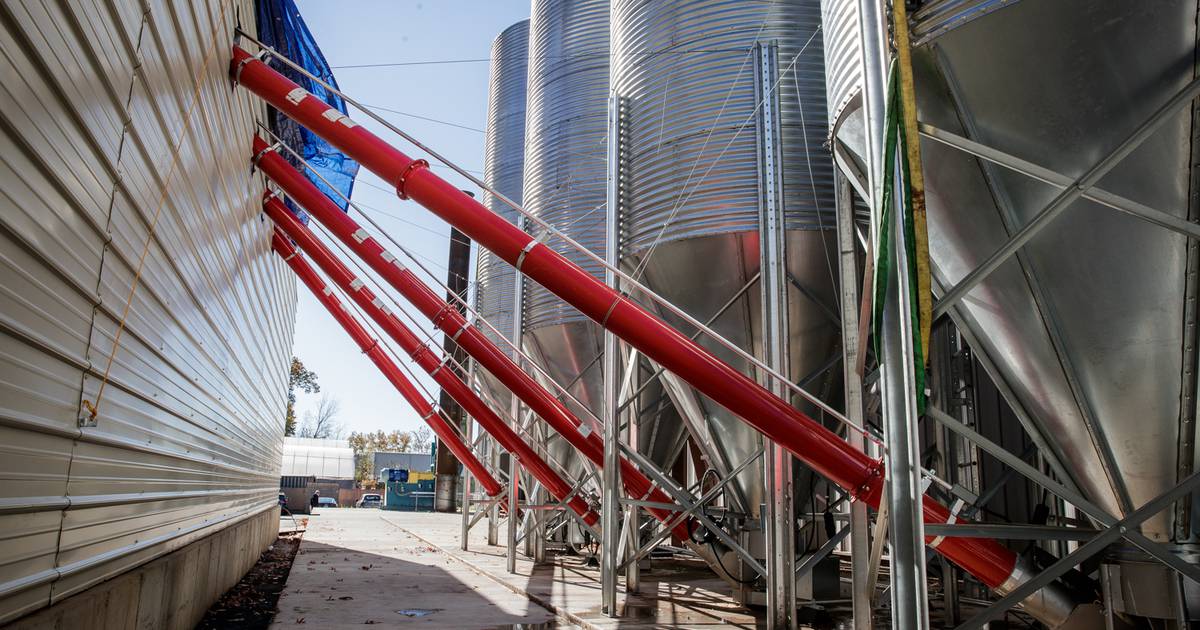[ad_1]
Inside Bright Feeds’ new 25,000-square-foot Berlin plant, pallet loads of past-expiration pies, sacks of bad potatoes and trays of spoiled popcorn in individual bags await their turn in a massive industrial processor.
They’ll go through multiple filtration systems to strip away packaging and impurities, an airtight processing tank and a 600-degree drying system before emerging as animal feed.
In an era when the cost and environmental damage of traditional trash disposal continues to worsen, Bright Feeds and Connecticut environmental officials are hoping the company’s high-tech plant represents part of a more sustainable future.
“This could be a critical piece of the solution,” Commissioner Katie Dykes of the state Department of Energy and Environmental Protection said Thursday at a ribbon-cutting ceremony at the plant. “There’s a dire waste disposal crisis we’re facing with the closure of the MIRA waste-to-energy facility.”
:quality(70)/cloudfront-us-east-1.images.arcpublishing.com/tronc/GRIY45GYNNDD3GVM4JZGJ64SP4.jpg)
The long-expected shutdown of the sprawling trash incinerator in Hartford’s South Meadows has Connecticut shipping much of its trash to landfills in Pennsylvania, a solution that waste disposal experts agree is too costly, environmentally unsound and, ultimately, not sustainable.
Like other states across the country, Connecticut is looking for ways to divert a lot of material out of the trash stream. Organic waste, a key target, accounts for an estimated one-third of all garbage. The goal for years has been to find a way to recycle the tons of food waste generated each day by homes, restaurants, school and office cafeterias, supermarkets, bakeries, breweries and food manufacturers.
Bright Feeds board Chairman Howard Kalb believes his fledgling company can offer a big part of the answer.
:quality(70)/cloudfront-us-east-1.images.arcpublishing.com/tronc/CN6HV3XVKVAQTBYEOZXSRU6VUE.jpg)
“Bright Feeds processes excess and unused and converts it into nutritious animal feed. It’s the first food waste to animal feed in the state, and we believe, given our unique technology and process, the first of its kind anywhere in the country,” Kalb said.
A high-tech system of monitors and sensors sends various types of food waste into the main processor, then directs the resulting slurry into a 600-degree drying system and enormous ductwork network.
The system evaluates the product for moisture, protein, fiber and ash, and automatically varies the mix to produce specialized feeds for farms.
Just two years ago, Kalb and a team of entrepreneurs talked with municipal and Lamont administration officials about ways to keep food waste out of landfills and trash incinerators. One result was the Bright Feeds project, which is led by Chief Executive Officer Jonathan Fife and President Tim Rassias.
The nonprofit AdvanceCT organization quietly scouted out the Berlin site for the plant.
:quality(70)/cloudfront-us-east-1.images.arcpublishing.com/tronc/7O76ZQC3GVGR5JUMNPQFIU4QKI.jpg)
The central location is intended as a benefit to both sets of Bright Feeds customers: Food manufacturers and qualified waste haulers from Connecticut that bring food waste to the facility for a fee that Kalb said is far lower than the cost of landfills or incinerators, while feed companies from across New England buy the processed food to sell to poultry and pig farms.
“Our mission is threefold: We want to help municipalities, businesses and residents save money on their waste disposal costs; we want to hep farmers access high-quality feed at low prices; and we want to help our climate in the fight against global warming,” Kalb said.
In just two months the plant has signed up customers to supply about 60 tons of food waste a day. Its state permit is for a maximum of 450 tons a day, and it hopes to reach that level quickly.
Five Things You Need To Know
Daily
We’re providing the latest coronavirus coverage in Connecticut each weekday morning.
“At capacity, that’s equivalent to taking 100 to 200 metric tons of carbon from the atmosphere every year. Now that, we believe, will take a bite out of climate change,” he said.
The MIRA plant handled about a third of all of Connecticut’s trash, or about 1,600 tons a day, Fife said.
“Our process is not only greener than existing food waste recycling solutions, but it’s actually carbon negative,” Fife said. “We believe we have a model that can be used throughout the country.”
Dykes’s agency set up a working group two years ago to prepare for the loss of the MIRA plant, and Fife credited that effort with encouraging Bright Feeds to establish its new Berlin plant.
“We found that diverting organics can be major solution. We are burning and burying valuable material — food waste and yard waste. I’m so proud of what you’re doing here,” Dykes said. “This is the best of Connecticut.”
Chris Edge, Berlin’s economic development director, said the plant is a special type of economic development for his town.
“This is a place where someone could work. If you want purpose-driven, I can’t think of anything more purpose-driven than what’s happening in the building,” Edge said. “This is where we’re headed.”
[ad_2]
Source link
